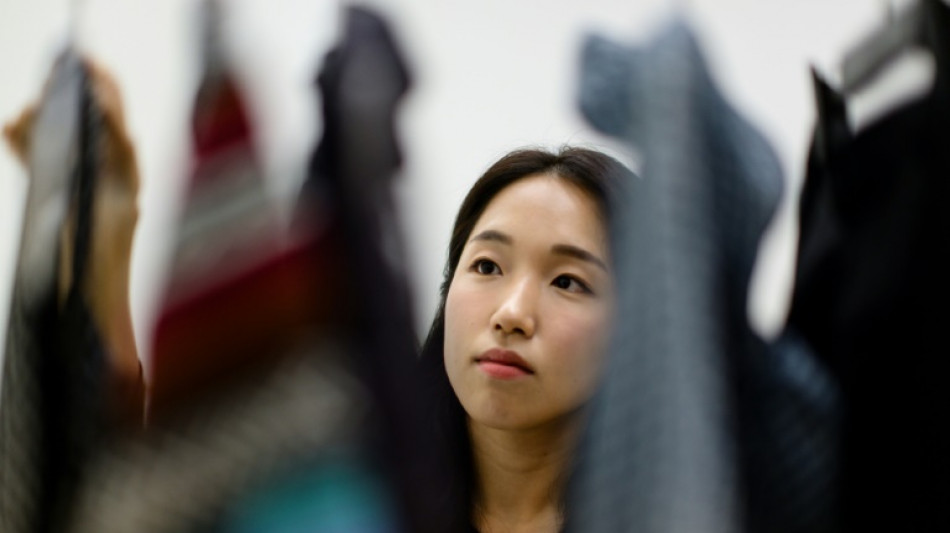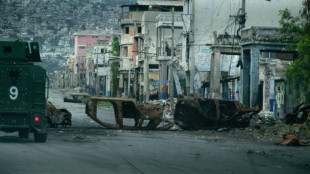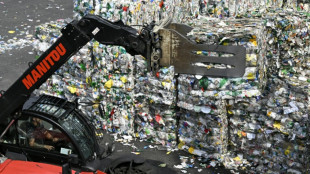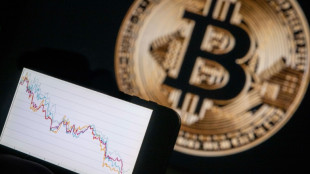
-
 Police warn Sydney protesters ahead of Israeli president's visit
Police warn Sydney protesters ahead of Israeli president's visit
-
Bolivia wants closer US ties, without alienating China: minister

-
 Ex-MLB outfielder Puig guilty in federal sports betting case
Ex-MLB outfielder Puig guilty in federal sports betting case
-
Milan-Cortina Winter Olympics open with dazzling ceremony

-
 China overturns death sentence for Canadian in drug case
China overturns death sentence for Canadian in drug case
-
Trump reinstates commercial fishing in protected Atlantic waters

-
 Man Utd can't rush manager choice: Carrick
Man Utd can't rush manager choice: Carrick
-
Leeds boost survival bid with win over relegation rivals Forest

-
 Stars, Clydesdales and an AI beef jostle for Super Bowl ad glory
Stars, Clydesdales and an AI beef jostle for Super Bowl ad glory
-
Dow surges above 50,000 for first time as US stocks regain mojo

-
 Freeski star Gu says injuries hit confidence as she targets Olympic treble
Freeski star Gu says injuries hit confidence as she targets Olympic treble
-
UK police search properties in Mandelson probe

-
 Bompastor extends contract as Chelsea Women's boss despite slump
Bompastor extends contract as Chelsea Women's boss despite slump
-
Milan-Cortina Winter Olympics open with glittering ceremony

-
 A French yoga teacher's 'hell' in a Venezuelan jail
A French yoga teacher's 'hell' in a Venezuelan jail
-
England's Underhill taking nothing for granted against Wales

-
 Fans cheer for absent Ronaldo as Saudi row deepens
Fans cheer for absent Ronaldo as Saudi row deepens
-
Violence-ridden Haiti in limbo as transitional council wraps up

-
 Hundreds protest in Milan ahead of Winter Olympics
Hundreds protest in Milan ahead of Winter Olympics
-
Suspect in murder of Colombian footballer Escobar killed in Mexico

-
 Colombia's Rodriguez signs with MLS Minnesota United
Colombia's Rodriguez signs with MLS Minnesota United
-
Wainwright says England game still 'huge occasion' despite Welsh woes

-
 WADA shrugs off USA withholding dues
WADA shrugs off USA withholding dues
-
France detects Russia-linked Epstein smear attempt against Macron

-
 Winter Olympics to open with star-studded ceremony
Winter Olympics to open with star-studded ceremony
-
Trump posts, then deletes, racist clip of Obamas as monkeys

-
 Danone expands recall of infant formula batches in Europe
Danone expands recall of infant formula batches in Europe
-
Trump deletes racist video post of Obamas as monkeys

-
 Colombia's Rodriguez signs with MLS side Minnesota United
Colombia's Rodriguez signs with MLS side Minnesota United
-
UK police probing Mandelson after Epstein revelations search properties

-
 Russian drone hits Ukrainian animal shelter
Russian drone hits Ukrainian animal shelter
-
US says new nuclear deal should include China, accuses Beijing of secret tests

-
 French cycling hope Seixas dreaming of Tour de France debut
French cycling hope Seixas dreaming of Tour de France debut
-
France detects Russia-linked Epstein smear attempt against Macron: govt source

-
 EU nations back chemical recycling for plastic bottles
EU nations back chemical recycling for plastic bottles
-
Terror at Friday prayers: witnesses describe blast rocking Islamabad mosque

-
 Iran expects more US talks after 'positive atmosphere' in Oman
Iran expects more US talks after 'positive atmosphere' in Oman
-
US says 'key participant' in 2012 attack on Benghazi mission arrested

-
 Why bitcoin is losing its luster after stratospheric rise
Why bitcoin is losing its luster after stratospheric rise
-
Arteta apologises to Rosenior after disrespect row

-
 Terror at Friday prayers: witness describes 'extremely powerful' blast in Islamabad
Terror at Friday prayers: witness describes 'extremely powerful' blast in Islamabad
-
Winter Olympics men's downhill: Three things to watch

-
 Ice dancers Chock and Bates shine as US lead Japan in team event
Ice dancers Chock and Bates shine as US lead Japan in team event
-
Stellantis takes massive hit on 'overestimation' of EV demand

-
 Stocks rebound though tech stocks still suffer
Stocks rebound though tech stocks still suffer
-
Spanish PM urges caution as fresh rain heads for flood zone

-
 Iran says to hold more talks with US despite Trump military threats
Iran says to hold more talks with US despite Trump military threats
-
Russia accuses Kyiv of gun attack on army general in Moscow

-
 Cambodia reveals damage to UNESCO-listed temple after Thailand clashes
Cambodia reveals damage to UNESCO-listed temple after Thailand clashes
-
Norway crown princess 'deeply regrets' Epstein friendship


No new clothes: S. Korean climate activist targets hyperconsumption
Recovering South Korean shopaholic-turned-climate activist Lee So-yeon used to buy new clothes almost daily -- until a $1.50 winter coat triggered an awakening that stopped her shopping entirely.
While looking at the ultra-cheap padded jacket at an H&M shop in the United States, where she was working at the time, Lee asked herself how any item of clothing could be sold so cheaply.
The 30-year-old embarked on a deep dive into fast fashion production methods and was horrified at the human, social and environmental toll hyperconsumerism is having on the planet -- and on the mental health of women who make and buy cheap clothes.
"I used to buy one new outfit each (working) day of the week," Lee told AFP, adding that each item from major high street retailers would typically cost less than a dollar.
But the reason the clothes are so cheap, Lee learned, is because the women who sew for companies are paid little, while the business model itself is causing significant environmental harm.
Lee stopped buying any new clothes -- and has not purchased a single fast fashion garment since her epiphany around six years ago.
Her much more compact wardrobe consists of used items that she received from friends and family, including a vintage leather jacket that once belonged to her mother.
Unlike fast fashion items, which are often designed to be thrown away after just a few wears, each piece is irreplaceable because it carries a unique story and history, she said.
"Ultimately, the most eco-friendly clothes are the ones already in your wardrobe," said Lee.
- Break the cycle -
Lee now organises clothing swaps with her friends and family, and has written a book to promote the idea of valuing garments for "the story behind it," rather than chasing ephemeral trends.
She is part of a small but growing global movement seeking to promote second-hand clothing and help people -- especially women -- opt out of the cycle of over-consumption.
The app Lucky Sweater provides a platform for users to trade items from their closets with each other, focussing on sustainable brands, founder Tanya Dastyar told AFP.
"We're programmed to believe the only way to express my fashion or show that I'm beautiful or trendy... is new outfits," Dastyar said.
"But you can still be fashionable and feel good and look great and not have to do that," she said, adding that although trading clothes did not have the same quick dopamine hit as making a fast-fashion purchase, it was far more rewarding over time.
The app's growing uptake indicates that people are hungry to shift their relationship with clothing and consumerism, she said.
People realise: "I don't have to follow trends and I can just dress in a way that feels comfortable to me," she said. "Is that like a mass market thing? No. But do I feel like it can be a movement? Yes."
For Lee, breaking the cycle of cheap clothing consumption helped her improve her mental health.
As a teenager, she would worry about what to wear on school trips -- when uniforms were not required -- at least a month in advance and would go shopping to ease her fears.
"I felt a lot of pressure about how others would see me," she told AFP.
But learning about Bangladesh's 2013 Rana Plaza tragedy -- one of the world's worst industrial disasters that killed more than 1,130 garment factory workers, most of them young women -- was a turning point.
The factory workers died making clothes for "women like me", Lee said.
- No second-hand? -
The global fashion industry is one of the most polluting, accounting for up to 10 percent of greenhouse gas emissions, according to World Bank estimates.
Most modern clothes are made of synthetic materials like nylon and polyester, which are essentially plastic and do not biodegrade in landfills, industry data shows.
Keeping clothes out of landfills can help, but in South Korea, many still avoid used garments, said Kim Dong-hyun, who runs a used clothing export factory.
"People often don't look favourably on someone wearing used clothes because they are seen as unwanted items," Kim told AFP, noting he has found dirty diapers and food waste in the collection bins.
South Korea is the fifth largest exporter of used clothing in the world -- and activists say many garments are essentially dumped in developing countries, which lack the capacity to process them.
At Kim's second-hand clothing factory in Paju, outside Seoul, a mechanical claw categorised piles of used clothes to be exported overseas.
"Many people treat the clothing collection bin as just a trash can," Kim said.
K.AbuTaha--SF-PST


